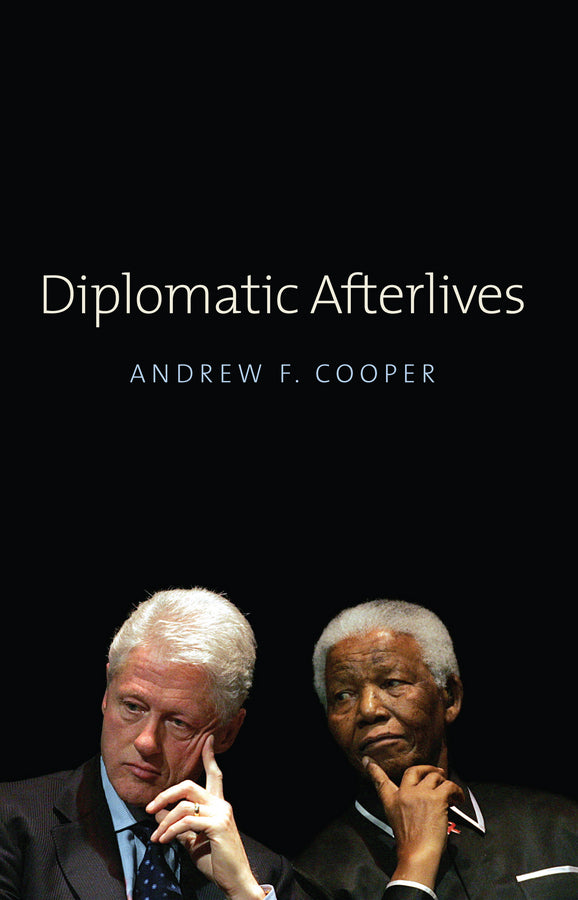Description
Explore the intriguing world of 'Diplomatic Afterlives,' a thought-provoking book by Andrew F. Cooper that examines the unique roles of former political leaders in global diplomacy. As prominent figures like Nelson Mandela, Jimmy Carter, and Bill Clinton transition from public office to a more activist role, this book sheds light on their motivations and methods in navigating the complex landscape of post-political life. These leaders harness their fame and connections to influence international relations beyond traditional state boundaries. Cooper’s comprehensive analysis not only highlights the contributions of these influential personalities but also raises essential questions about accountability and the implications of allowing such individuals to shape global affairs. With 186 pages of insightful discussion, 'Diplomatic Afterlives' is essential reading for those interested in international politics, the intersection of power and celebrity, and the evolving nature of diplomacy in the 21st century. Furthermore, the book encourages readers to critically evaluate the balance between personal ambition and public service. Don't miss your chance to delve into this captivating exploration of politics and diplomacy.
Note: Shipping for this item is free. Please allow up to 6 weeks for delivery. Once your order is placed, it cannot be cancelled.
Condition: BRAND NEW
ISBN: 9780745661995
Year: 2014
Publisher: John Wiley & Sons (UK)
Pages: 186
Description:
No longer content to fade away into comfortable retirement, a
growing number of former political leaders have pursued diplomatic
afterlives. From Nelson Mandela to Jimmy Carter, and Bill Clinton,
to Tony Blair and Mikhail Gorbachev, this set of highly-empowered
individuals increasingly try to make a difference on the global
stage by capitalizing on their free-lance celebrity status while at
the same time building on their embedded ?club? attributes and
connections.
In this fascinating book, Andrew F. Cooper provides the first
in-depth study of the motivations, methods, and contributions made
by these former leaders as they take on new responsibilities beyond
service to their national states. While this growing trend may be
open to accusations of mixing public goods with private material
gain, or personal quests to rehabilitate political image, it must ?
he argues ? be taken seriously as a compelling indication of the
political climate, in which powerful individuals can operate
outside of established state structures. As Cooper ably shows,
there are benefits to be reaped from this new normative
entrepreneurism, but its range and impact nonetheless raise
legitimate concerns about the privileging of unaccountable
authority.
Mixing big picture context and illustrative snapshots,
Diplomatic Afterlives offers an illuminating analysis of the
influence and the pitfalls of this highly visible but
under-scrutinized phenomenon in world politics.
Note: Shipping for this item is free. Please allow up to 6 weeks for delivery. Once your order is placed, it cannot be cancelled.
Condition: BRAND NEW
ISBN: 9780745661995
Year: 2014
Publisher: John Wiley & Sons (UK)
Pages: 186
Description:
No longer content to fade away into comfortable retirement, a
growing number of former political leaders have pursued diplomatic
afterlives. From Nelson Mandela to Jimmy Carter, and Bill Clinton,
to Tony Blair and Mikhail Gorbachev, this set of highly-empowered
individuals increasingly try to make a difference on the global
stage by capitalizing on their free-lance celebrity status while at
the same time building on their embedded ?club? attributes and
connections.
In this fascinating book, Andrew F. Cooper provides the first
in-depth study of the motivations, methods, and contributions made
by these former leaders as they take on new responsibilities beyond
service to their national states. While this growing trend may be
open to accusations of mixing public goods with private material
gain, or personal quests to rehabilitate political image, it must ?
he argues ? be taken seriously as a compelling indication of the
political climate, in which powerful individuals can operate
outside of established state structures. As Cooper ably shows,
there are benefits to be reaped from this new normative
entrepreneurism, but its range and impact nonetheless raise
legitimate concerns about the privileging of unaccountable
authority.
Mixing big picture context and illustrative snapshots,
Diplomatic Afterlives offers an illuminating analysis of the
influence and the pitfalls of this highly visible but
under-scrutinized phenomenon in world politics.

